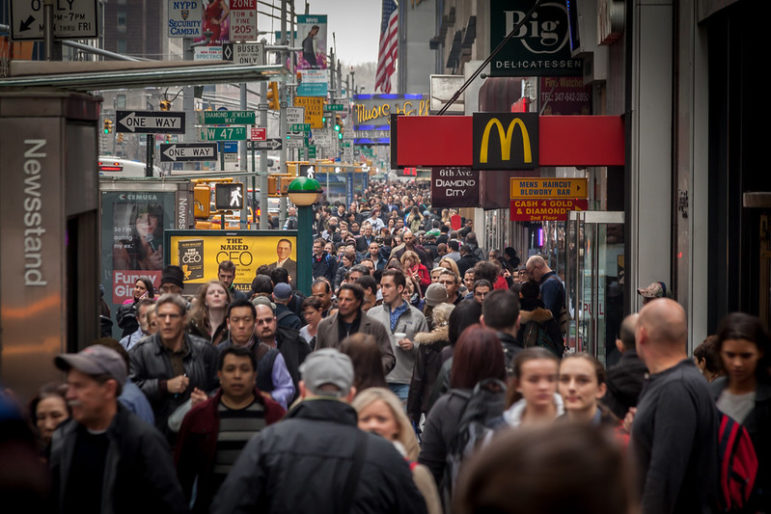
The New York metropolitan area has become the epicenter of COVID-19 in America since my partner and I started sheltering-in-place two weeks ago (we already had to postpone our April wedding). It is increasingly likely that our hospital system will be overwhelmed in the coming weeks. Governor Cuomo has repeatedly pointed to one explanation for why: density.
I want to be clear now and for the historical record: density isn’t why COVID-19 is ripping through NYC. This is misguided and dangerous—both for dealing with the immediate health crisis caused by COVID-19 and for the long-term health of our economy and planet.
NYC is by far the largest and densest city in America, with over 8.6 million inhabitants, averaging 27,000 people per square mile. That density is only possible because of walkable neighborhoods, tall buildings, and mass transit. It’s tempting to say these same factors are why we’ve seen such a terrible spread of the virus. But our city’s density is not the problem.
The lack of a coordinated initial response from the federal government is. COVID-19 is a highly contagious disease with no cure. The Trump Administration had two months to prepare our already strained and inadequate healthcare system (made weaker by billions of dollars in cuts and closings overseen by Governor Cuomo) but didn’t. Any other explanation is misinformed, partisan, or both.
Blaming NYC’s density also ignores the experiences of cities like Singapore, Hong Kong, and even others in China. They have all had minimal outbreaks through fast and highly coordinated initial responses that included social distancing and limiting travel, aggressively testing for symptoms, and isolating positive cases. If density was the problem, these cities would have been overrun regardless of their individual responses. That didn’t happen.
 CityViews are readers’ opinions, not those of City Limits. Add your voice today!
CityViews are readers’ opinions, not those of City Limits. Add your voice today!
It is imperative that our leaders recognize the early successes in these cities, and adapt our response in America. Eighty-four percent of Americans live in or near cities and 72% of job growth since the Great Recession has occurred in them. Our country won’t flatten the curve of COVID-19 or overcome the economic crisis unless cities lead the charge.
Those of us who live in cities are on the frontline of COVID-19. We are also people—homerenters, service workers, people of color, undocumented immigrants and young people—long ignored or exploited by federal policies geared more towards promoting white suburban homeownership. Our federally elected representatives are proving just how ill-equipped they are at fighting for us.
The federal government should force all cities to shut down non-essential commerce and guarantee workers and small businesses lost incomes for the duration of the emergency, which could be months. It should cancel rent for all homerenters. It should fully fund failing public transit systems and make them fare-free since only essential workers are riding. The U.S. Treasury should assume any gaps in operating budgets of cities and states as they tackle unprecedented unemployment claims and collapsing revenues. And, most importantly, it should coordinate a massive infusion of medical resources to fight emerging urban clusters quickly to limit the spread.
Not adapting now will have consequences long after COVID-19. The future of our country and planet will be won or lost in our cities. We must defend them during this outbreak and we must center them in our social and economic recovery. In a word, density is our destiny.
I know that it will be hard to see for many New Yorkers as we anxiously sit at home in tiny apartments hearing ambulances racing our sick neighbors to overstretched hospitals. At a time when we want and need to come together, we can’t. For now, remaining apart is how we come together. Someday, hopefully sooner than later, that will switch. And luckily for us, in a place as dense as New York, it will only take opening our doors to embrace one another.
Peter Harrison is a writer and organizer who is running in the Democratic primary for the 12th Congressional District.










2 thoughts on “Opinion: Density is not Why NYC is the Coronavirus Epicenter”
West New York, NJ has a population of 52,407 and is the 768th largest city in the United States. The population density is 52,709 per sq mi which is 4238% higher than the New Jersey average and 58078% higher than the national average.
Of course Singapore, Hong Kong and China are autocracies. Chew gum in Singapore you go to jail. There’s food for thought.
BTW I heard Singapore & Hong Kong are getting ready for COVD-19 Part Two: The Revenge of the Virus.